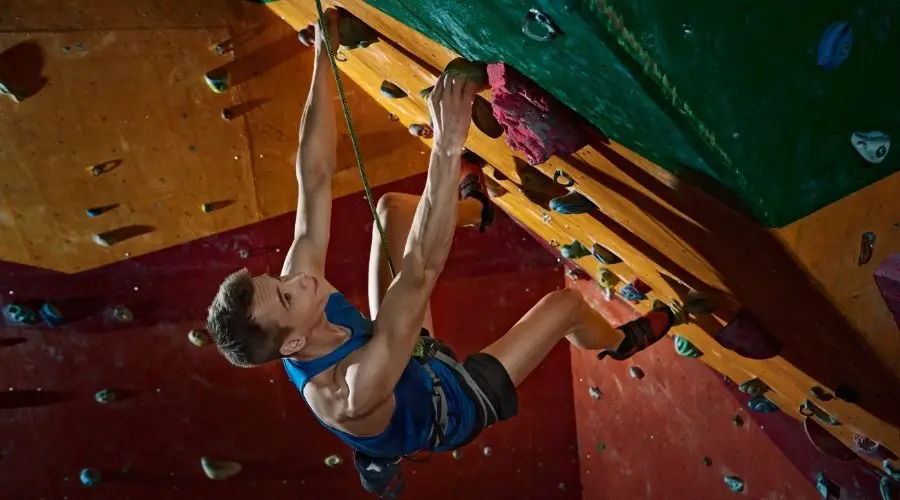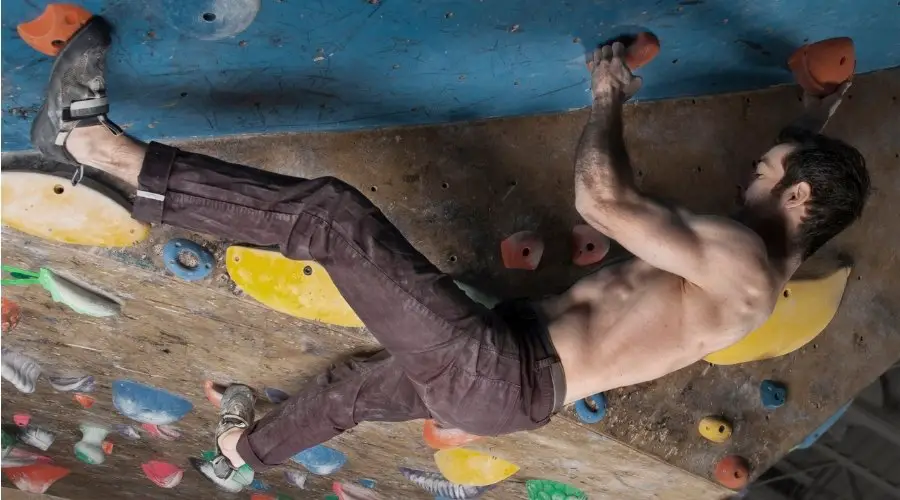Weight loss and climbing have become intertwined over the years and for good reason. Climbing has been heralded as a great workout for losing weight and has been toted as one of the best full body workouts. What has been less widely discussed however is how weight loss affects a climber’s performance.
As a general rule, losing weight improves the climbing performance of overweight climbers. Excess fat loss increases the climber’s relative strength and improves their climbing ability. Weight loss in climbers with low body fat levels can hinder climbing performance and may lead to health problems.
The effects of weight loss on climbing ability is not as cut and dry as it seems. In fact, in some scenarios, losing weight can even be detrimental to climbing performance and could lead to health problems. This article discusses when weight loss is beneficial for climbing and when it isn’t.
If you are interested in seeing what the current prices are for the most popular rock climbing training aids, you can find them on Amazon by clicking here. Using the Amazon affiliate link above and/or other links in the article helps support this website.
Medical Disclaimer: I am not a doctor and this article is meant for informational purposes only. The information presented in this article is not intended or implied to be a substitute for professional medical advice. Before starting any diet or exercise plan you should always consult a medical doctor.
How Weight Loss Improves Climbing Ability

Climbing is a sport that largely depends on a climber’s strength output and how it compares to their body weight. We can term this “relative strength”. This can be written as:
Relative Strength = Absolute Strength / Body Weight
An easy way to think of this is to imagine putting a 20 pound weight vest on and doing as many pull-ups as possible. Then take off the vest and try again. You will certainly be able to do more pull-ups without the vest than with it. Why is this? Well, you didn’t magically get stronger in the 2 seconds it took to take the vest off, you just got lighter. Aka, your relative strength increased.
Climbers are constantly moving their body weight up and across the wall by using tiny holds and advanced techniques. Lowering the amount of weight they have to move around will allow them to increase their relative strength. They will be able to climb harder for longer when they are lighter.
It is important to note that this only holds true if the climber’s absolute strength output remains the same after weight loss. This is where we need to define the type of weight loss we are talking about.
Lose Fat Not Muscle For Climbing Performance

Body weight is a very broad term as it doesn’t just describe the amount of fat on someone’s body. Body weight includes the weight of everything in the body: bones, water, organs, muscle, glycogen stores, fat, etc.
Generally when discussing weight loss, people are implying fat loss. Achieving pure fat loss however is incredibly difficult (if not impossible) to do. It is possible however to influence the amount of fat loss in relation to other aspects i.e. muscle mass.
To maintain absolute strength levels when losing weight, it is important that climbers do not crash diet and lose weight too quickly. Losing weight too quickly will cause the climber to lose a significant amount of muscle mass, glycogen stores and water weight along with fat.
Without getting too deep into the weeds here, it is possible to maintain absolute strength levels by creating a small calorie deficit (such that the climber loses approximately 0.5% to 1% of body weight per week), maintaining a high protein intake (0.8 to 1 gram of protein per pound of body weight), and stimulating the muscles (continuing to climb and exercise during weight loss).
Note: in VERY rare circumstances, climbing ability will actually improve with muscle loss. For example, imagine an elite body builder tried to become a professional rock climber. Sure, they may be a lot stronger but they also are three hundred pounds. Moving that much weight up the wall would be too taxing and unsustainable. Their relative strength ratio would not be optimized and they would need to lose muscle mass to compensate.
Elite rock climbing is truly a balancing act between absolute strength and body weight.

When Weight Loss Hinders Climbing Ability
As mentioned in the introduction, weight loss can actually decrease a climber’s performance in the gym. Climbers who are already very lean will start to notice a dramatic drop in strength and energy in the gym and everyday life when they lose too much weight.
Human bodies need a certain amount of essential fat to function. Once the body starts to approach this level of fat, it goes into a survival mode and tries to limit all energy expenditure. This is the body’s attempt to stay alive.
The body’s desire to conserve energy for survival leads to feeling of constant exhaustion, mental fatigue and increased irritability. Becoming too lean is a sure fire way for climbers to kill their motivation and limit their ability to climb hard grades.
This leads to a cap being placed on the relative strength equation. An optimal body fat percent exists where climbers are light and athletic performance is still firing on all cylinders. This body fat percentage is different for everyone and largely depends on the climber’s genetics.
It is important to note that lowering body fat levels too low is extremely dangerous and should not be taken lightly. Bodily functions can cease to properly operate and people have died from not having enough body fat.

Real Life Evidence
Professional climbers are great examples of the “optimal” body fat percentage for climbing. Most professional climbers are between 7 to 11 percent body fat (for men) and 17 to 21 percent body fat (for women).
These are human beings who have dedicated their life to climbing and are competing to be the absolute best in a sport that relies heavily on relative strength. If climbing performance increased with having body fat levels lower than this then it would be seen throughout the professional climbing community.
It is very rare to see professional athletes in any sport with sub 7 to 8 percent body fat for men and 17 to 18 percent for women. This is due to the body’s need of certain fat levels to regulate hormones and bodily functions. Getting to body fat levels lower than this is extremely dangerous can feel like death as every professional bodybuilder will tell you.
The Bottom Line
For the majority of the population, losing weight will help improve climbing performance as it increases the climber’s relative strength. However, if you are already lean, losing additional weight may not be the right call. Weight loss at already low body fat levels can cause a decrease in strength and loss of muscle mass if done incorrectly. I am not a doctor and you should always consult a doctor before starting any diet or exercise plan.
